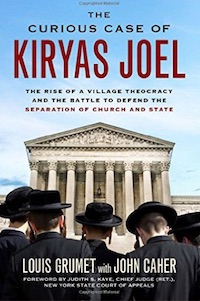New York Governors Mario Cuomo and George Pataki trashed the Constitution to please the powerful, bloc-voting Hasidim that had taken over the town of Kiryas Joel in Orange County, just north of New York, says a new book.
|
|
Louis Grumet, former aide to Governor Cuomo, who held office from 1983-94, says in The Curious Case of Kiryas Joel that he was “dumbstruck” during a visit with Cuomo when the governor failed to see “the Constitutional infirmity” in the bill that created a special educational district for the Satmar sect in Kiryas Joel, a town in Orange county.
Grumet, who was a special assistant to Cuomo when he was secretary of state, later serving with the State Education Dept. and becoming executive director, New York State CPAs, writes that Cuomo saw the problem with the 1989 bill, but “he just didn’t care.”
Grumet read the bill to Cuomo and said it violated not only the Constitution but the New York State Blaine Amendment that bars use of public funds for “any religious denomination.”
Cuomo’s “temper flared” and he accused Grumet himself of not trying to block the bill. Cuomo also showed sympathy for the Satmar, saying, ‘But Luig, it’s just a school for thirteen poor, retarded immigrant children.”
While Grumet always referred to Cuomo as “governor,” Cuomo only referred to Grumet as “Luig,” a belittling nickname Cuomo had devised for Grumet some years earlier.
Grumet told Cuomo that if Cuomo signed the bill the courts would “knock it out” and it would be a “huge embarrassment” to Cuomo since he was supposed to be a great “constitutionalist” governor.
Cuomo Boots Grumet
Cuomo didn’t like that remark and “ushered” Grumet out of the office.|
|
“Who’s going to sue?” asked Cuomo. “Ticked off, I said I would,” was the retort from Grumet, a lawyer who is also Jewish.
Writes Grumet: “I was sick at the thought of a man I admired as much as Mario Cuomo treating the Constitution as just another political chip as long as he thought no one would sue.”
The 1994 lawsuit, Board of Education of Kiryas Joel Village School District v. Grumet, which was decided in favor of Grumet, “stands as the most important legal precedent in the fight to uphold the separation of church and state,” says a blurb for the book.
Grumet, aided by lawyer Jay Worona working pro bono, went through 11 hearings in state and federal courts up to the Supreme Court in the quest to block the special KJ school district.
It was all for naught since every time a court voided the district New York State Legislature would create a new one. The last and successful one was passed 1999 and applied to any municipality with between 10,000 and 25,000 residents contained within a larger school district. KJ has operated under this framework ever since.
Pataki Backed KJ School District
George Pataki, governor from 1995-2006, a former Republican assemblyman from Peekskill whose district included parts of Orange county, owed much of his political success to support from the Hasidim, writes Grumet.
“Pataki knew that the Satmar vote as a bloc and that the little enclave in his district was an entrée into the much larger enclave in Brooklyn,” he writes. “If he could influence the Brooklyn Satmar, he could influence the state’s Democratic stronghold and begin making a mark.”
 Pataki worked with Democratic Assemblyman Joe Lentol who was said to have a “huge Satmar constituency.” Both worked with Tony Genovese, an Assemblyman from Carnarsie, Brooklyn, described by Grumet as “leader of the most powerful Democratic club in the county,” and Assembly speaker Mel Miller. The “stealth” Pataki-Lentol bill passed 14-1 in the assembly and was “buried in a large package of bills before the state senate.”
Pataki worked with Democratic Assemblyman Joe Lentol who was said to have a “huge Satmar constituency.” Both worked with Tony Genovese, an Assemblyman from Carnarsie, Brooklyn, described by Grumet as “leader of the most powerful Democratic club in the county,” and Assembly speaker Mel Miller. The “stealth” Pataki-Lentol bill passed 14-1 in the assembly and was “buried in a large package of bills before the state senate.”
“In the waning hours of the last day of the [1989] legislative session, the senate approved the Pataki-Lentol bill with no fanfare, no publicity,” writes Grumet. “The vast majority of state legislators had absolutely no idea what they were voting on.”
Grumet writes that Miller “did not approve” of the Pataki-Lenton bill and “knew that giving them (Satmar) a school district to run would violate the constitutional principle of separation of church and state. All of his attorneys told him so and, as a lawyer, he not no trouble grasping what was legally and constitutionally obvious.”
But the Pataki-Lentol “brainstorm” yielded a “have-your-cake-and eat-it-too political bonanza.” Supposedly, it would be vetoed by Cuomo and even if he signed it, the courts would “shoot it down,” writes Grumet.
Eruv Battle Shows New Power Lineup
The battle over creation of Orthodox Jewish religious boundaries called eruvim in Southampton, Quogue and Westhampton Beach shows the Hasidim now more allies than they did in the battle over the KJ school district.
Grumet’s allies included the American Jewish Council, the New York Committee for Public Education and Religious Liberty, the New York State United Teachers and the National Education Assn.
Supporting Grumet’s campaign against the new school district were “articles and editorials in the New York Times, Newsday, Albany Times Union, Middletown Times-Herald-Record, Buffalo News and the 22 Gannett newspapers. “All were supportive of our position,” he writes.
Next step was winning the “legal battle,” which the Grumet forces also won. What they didn’t win was the political battle.
A question that presents itself is what took Grumet more than 20 years to write this book? He was afraid, that’s why not.
He had “witnessed the extraordinary and terrifying power that a small religious enclave, which votes heavily and contributes heavily, can exert over the political system and our government.”
Hamptons Eruv Opponents Outgunned
Eruv opponents in the Hamptons are up against the East End Eruv Assn., which gets free legal advice from the $1.3 billion Weil, Gotshal & Manges law firm, one of the top 15 law firms in the U.S.
Mayor Maria Moore of Westhampton Beach has failed to have a town hall or press conference on the eruv issue. She led approval of a deal with EEEA before the public could see it or discuss it. Rather than Moore signing the agreement, it was signed by outside counsel Brian Sokoloff. We have asked her why she didn’t sign it to no avail.
Southampton Town Supervisor Anna Throne-Holst and the SH Council passed a deal with the EEEA in the last few moments of the Aug. 25, 2014 Council with no discussion by Council members or the public or even notice that such a motion would be considered. Throne-Holst signed the deal.
Although this issue has confronted WHB since 2008, there is not one word about it in the Westhampton Free Library. Moore was on the library board for six years until last year and her husband Tom Moore is now president of the library.
Library, Bookstore Resist “Kiyras Joel” Book Thus Far
The WH library has the Kiyras Joel book on order but it could take a month to get it, the reference desk said. We would not be allowed to donate the book to the library, a staffer at the reference desk said. We obtained the KJ book in one day via Amazon.com.
|
|
Resistance was also encountered at the Books&Books bookstore on Main st., WHB. Jack McKeown, president, said he has ordered the book but is not sure whether it will be offered for sale. It depends on whether there is any demand for it, he said.
We asked if publisher Chicago Review Press, one of the largest distibutors of independent books in the U.S., could purchase a display in the front window of the store. He said that placement of books in that space was his prerogative.
We urged him to give prominence to the book because the subject matter is of vital interest to residents. It was the lead article in the Western edition of the June 9 SH Press. It should be required reading of local high school students and have prominent display in the library, we told McKeown.
Hasidism a Religion and a Culture
A very powerful religion and an associated culture have now asserted themselves in WHB and policies and procedures beyond the installation of an eruv can be expected. Certain behaviors are said to be "cultural" in nature rather than only "religious."
Hasidim children cannot go to public schools and a separate school district might have to be created, as was done in KJ.
“The boys never, never meet any girl,” Grumet was told by Rabbi Elliott Kohn, dean of the village’s religious school for girls. “They only have boy friends.”
A further passage: “Residents generally spoke Yiddish, not English. Television, radio, newspapers were eschewed if not banned outright. There was no baseball, no jeans, no sneakers, not birth control, and no private interaction between males and females prior to marriage, which was arranged and always within the sect. Religious leaders and religious tradition ruled virtually every hour of every day, and night, of the citizenry.”
An early spat with the local community was objections of the Satmar to women school bus drivers. “They (Satmar) were unreasonably and unceasingly demanding,” writes Grumet.
Governor Cuomo signed the bill creating the separate KJ school district “over the objections of every one of his top advisers,” writes Grumet.
“’Who’s going to sue? Cuomo asked dismissively and, I thought, rather arrogantly as he escorted me out of his office," wrote Grumet. "I will, I responded. The governor smiled at me with a condescending grin that I had seen many times when I worked for him. He clearly didn’t view a former bureaucrat running a largely obscure state association of school boards as much of a threat.”
Writes Grumet: “I was stunned and terribly disappointed in the governor’s disdain for the judicial process…a seemingly simple squabble between a religious sect and the broader community escalated into a major national dispute that pitted the New York political leadership against the state court system, the U.S. Supreme Court, and the media…but mostly, I was devastated that people I admired would so cavalierly abandon the Constitution when it didn’t fit their needs."





 Husch Blackwell Strategies has added FleishmanHillard alum Michael Slatin as a principal in its public affairs group.
Husch Blackwell Strategies has added FleishmanHillard alum Michael Slatin as a principal in its public affairs group. Rory Cooper, a veteran Republican operative and policy specialist, has joined Teneo’s Washington office as senior managing director in its strategy & communications practice.
Rory Cooper, a veteran Republican operative and policy specialist, has joined Teneo’s Washington office as senior managing director in its strategy & communications practice. Brian Fallon, who served as national press secretary for Hillary Clinton’s 2016 presidential run, is signing on next month as Vice President’s Kamala Harris’ campaign communications director.
Brian Fallon, who served as national press secretary for Hillary Clinton’s 2016 presidential run, is signing on next month as Vice President’s Kamala Harris’ campaign communications director. TikTok is nothing more than a Chinese propaganda tool that poses “a grave threat to America’s national security and, in particular, impressionable children and young adults,” say two Congressmen who want the platform registered as a foreign agent.
TikTok is nothing more than a Chinese propaganda tool that poses “a grave threat to America’s national security and, in particular, impressionable children and young adults,” say two Congressmen who want the platform registered as a foreign agent. Public Strategies Washington has added Abbie Sorrendino, a former aide to now Senate Majority Leader Chuck Schumer.
Public Strategies Washington has added Abbie Sorrendino, a former aide to now Senate Majority Leader Chuck Schumer.


 Have a comment? Send it to
Have a comment? Send it to 
No comments have been submitted for this story yet.